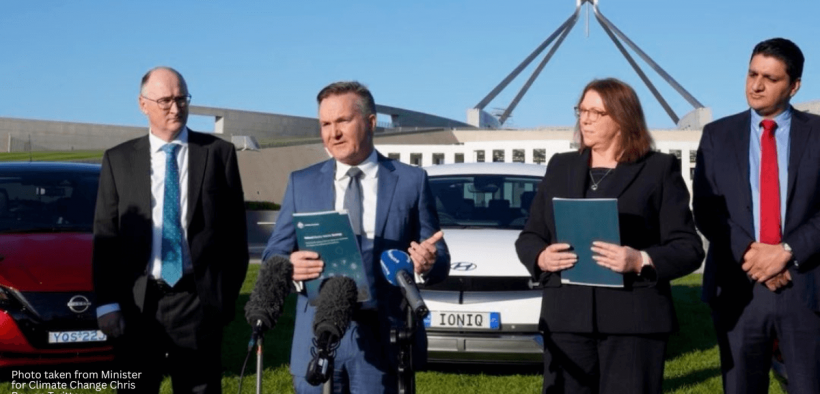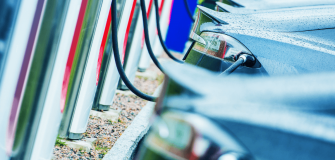Australia launches its first National Electric Vehicle Strategy
Share

The Australian Government has released its first National Electric Vehicle Strategy, setting a vision to increase the uptake of EVs to reduce emissions and improve the well-being of Australians.
After consulting with over 1,500 individuals and 200 organisations, the federal government states that improved cost, choice, availability, and accessibility of EV charging are fundamental for Australia’s successful transition to EVs.
As such, opportunities for national collaboration with State and Territory governments have been identified in order to design and deliver the systems and infrastructure needed.
Check out: Energy experts reveal cyber risk in adding electric cars to grid
Australia’s National Electric Vehicle Strategy aims to increase the supply of affordable and accessible EVs, establish the resources, systems and infrastructure to enable rapid EV uptake and encourage increased EV demand.
With these goals, the federal government expects an expansion of EV availability and choice, a reduction of road transport emissions, improve EV charging across the country, an increase in local manufacturing and recycling to create more affordable EVs and reduce the cost to Australians of running their vehicles.
Under the National Electric Vehicle Strategy, the federal government is also looking to introduce a fuel efficiency standard that will set an average carbon emissions limit. This will encourage car makers to sell EVs or more fuel-efficient vehicles to reducing fuel costs for motorists.
“It’s years overdue for Australia … there’ll be detailed consultation on design and how it interacts with other policies,” Minister for Climate Change Chris Bowen said.
“Fuel efficiency standards are an important step forward for our country and this commits the Albanese government to developing them.”
Check out: Electric vehicles to be prioritised thanks to new federal deal
Electric Vehicle Council’s Behyad Jafari told ABC News that the standards were a crucial part of increasing the number of EVs that car-makers send to Australia.
“The situation that we’re in today is that there are hundreds of thousands of Australians who are trying to buy electric vehicles but the supply isn’t there, and that’s because car companies choose to sell those vehicles in other markets because they have those standards in place,” he said.
“We are way behind the eight ball on this issue so it’s important that … we put [the standards] into place early.”
While the Australian Automobile Association (AAA) welcomed the decision to develop an efficiency standard, they stated that the government should plan on the declining revenue from the fuel excise due to the uptake in EVs.
“Roads don’t build themselves. It is critical that the transition to low and zero emissions technology includes a serious plan to secure solid funding streams for road construction and maintenance into the future,” AAA managing director Michael Bradley said.
“The AAA believes electric and other zero-emission vehicles should be brought into the tax system as soon as possible, but initially at a discounted rate to avoid disincentivising take-up.”
The strategy said the government would continue to monitor how a decrease in petrol consumption would impact the budget and the need for any future road user charge to replace the excise.
Eliza is a content producer and editor at Public Spectrum. She is an experienced writer on topics related to the government and to the public, as well as stories that uplift and improve the community.


Today’s Pick
11th Annual Aus Goverment Data Summit
April 1, 2025
7th Annual NZ Government Data Summit
May 7, 2025
3rd Public Sector Comms Week
May 14, 2025
Subscribe
We send emails,
but we do not spam
Join our mailing list to be on the front lines of healthcare , get exclusive content, and promos.
AI appointment Australia Australian boost boosts business businesses covid-19 cyber cyber attack cyber security cybersecurity data data breach data management defence Digital employment enhance enhances fraud funding governance government grants infrastructure Innovation Lockdown management new zealand NSW NZ online privacy public Public Sector queensland renewable energy scams security Social Media Technology telecommunications victoria
-

Understanding and building your digital strategy
Digital Government, Opinion
-

Featured Leader: Jamie Morse on multi-channel strategies for communication
Communications, Featured Leader
-

Featured Leader: Tegan Tembe of NSW Treasury on creating solid planning strategies and processes
Featured Leader
-

Wirraka Maya Health Service improves patient care with My Health Record
Learning
Show More-

Effects of ineffective communication in the workplace
Communications, Personal Development
-

7 ways you can enhance your personal development skills
News, Personal Development
-

5 advantages of working in the public sector
News, Personal Development, Professional Development
-

7 causes of communication issues in the workplace
Communications, News, Personal Development
Show MoreLast Viewed